Hundred Years War
1340 to 1453
England — versus — France
Edwardian, (Edward III, Black Prince), 1340-1360 Caroline, (Bertrand du Guesclin), 1369-1389 Lancastrian, (Henry V, Joan of Arc), 1415-1453
The Hundred Years War was a conflict between England and France that lasted, on and off, from 1340 until 1453. The war is often broken up into three phases: The first or "Edwardian" campaign lasted from 1340 until 1360, and went well for the English. The second or "Caroline" phase of the war lasted from 1369 until 1389 but was mixed up with several other wars in the region and resulted in a loss of much of the territory previously gained by the English. A long peace followed the second phase, until it was interrupted in 1415 by Henry V's highly successful campaign beginning at Agincourt. This third phase of the war, called the "Lancastrian" war, was tied up with an ongoing war between the Armagnacs and the Burgundians and went badly for the French until they were miraculously saved by the exploits of Joan of Arc, beginning in 1429. Her victories turned the momentum in France's favor, and England was finally driven out of France in 1453.
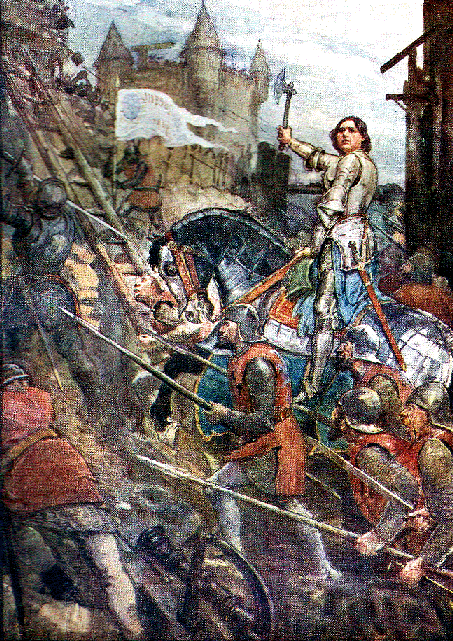 |
The hundred years war was historically significant for a few other reasons besides the failed quest for a Franco-British empire. At the outset of the war, France was far wealthier than Britain and had a vastly superior military by the standards of the day, meaning more knights and armour. Britain's armies, on the other hand, were largely infantry armed only with long bows. The fact that these weapons, in the hands of regular soldiers proved so effective against the knights in full armor, changed the nature of warfare considerably. The Hundred Years war, therefore, effectively ended the age of Chivalry and brought the Middle Ages to a close.
Edwardian : 1340–1360
 |
For ten years after securing Calais, Edward III turned his attention to other matters, and his son, the Black Prince, came of age. England now controlled both the northeastern-most region of France, directly across the English channel, and also Gascony (a.k.a. Aquitaine), in the southwestern-most corner. The Black Prince was based in Gascony, and in 1356 led a raiding party into the Loire valley in central France. John II of France (Philip VI had died in 1350), was with an army and set out in pursuit. The Black Prince tried to retreat back into English territory, but was cornered at Poitiers. Negotiations to avoid battle were of no avail, and the English, who were greatly out-numbered prepared for battle. Just as at Cressy, the smaller English troop, armed only with long-bows, routed the entire French army and took the king prisoner. The Black Prince won great renown for this battle, not only for his military exploits but also for the high degree of chivalry he displayed before, during, and after the battle. Several years later France and England negotiated a peace treaty, but they were never able to resolve the question of a ransom for the king, and John II died a captive in England.
| Date | Battle Summary | |
|---|---|---|
| Battle of Sluys
(Edwardian )
English victory
Fought June 24, 1340, when the English fleet of 250 sail, under Sir Robert Morley and Richard Fitzalan, attacked the French fleet of about 200 sail, under Hugues Quieret, lying in Sluys Harbour. Practically the whole of the French fleet was captured or destroyed, and Quieret was killed. The French lost 25,000 men, the English 4,000. | ||
| Battle of L'Ecluse (Edwardian )
English victory
Fought 1340, when the English fleet surprised the French in a narrow channel, and totally routed them, with a loss of 90 ships and 30,000 men. | ||
| Battle of Cressy
(Edwardian )
English victory
Fought August 26, 1346, when a very inferior force of English under Edward III defeated the French under Philip VI. The battle is notable as being the first in which the English army was mainly composed of infantry, and as proving the powerlessness of mounted men against the English archers. The French losses were 11 princes, 1,200 knights, and 30,000 of lesser ranks, a total exceeding the whole English force. | ||
| Siege of Calais
(Edwardian )
English victory
Siege was laid to this fortress in August 1346 by the English under Edward III. The citizens made a gallant defense, holding out for nearly a year, but at last were forced to surrender August 4, 1347. In the course of the siege, six burgesses offered themselves to the king as ransom for their fellow citizens; but their lives were spared on the intercession of Queen Philippa. | ||
| Siege of Aiguillon (Edwardian )
English victory
This fortress was besieged by the French under John, Duke of Normandy, in May, 1347, and was defended by a small English garrison under Sir Walter Manny, who held out bravely till the end of August, repelling numerous assaults. The defeat of Cressy then forced the Duke of Normandy to lead his army northward, and he was compelled to raise the siege. | ||
| Battle of Crotoye (Edwardian )
English victory
Fought 1347, during the siege of Calais by Edward III. The French fleet attempted to relieve the town, but was defeated and driven off with heavy loss by the English fleet. | ||
| Battle of Poitiers
(Edwardian )
English victory
Fought September 19, 1356, between 8,000 English, under Edward the Black Prince, and 80,000 French, under King John of France. The English occupied a strong position behind lanes and vineyards, in which their archers were posted. The French cavalry, charging up the lanes, were thrown into confusion by the bowmen, and were then taken in flank by the English knights and men-at-arms, who completely routed them, with a loss of 8,000 killed, and numerous prisoners, including the King, The English losses were very small. | ||
| Battle of Cadsand (Lancastrian )
English victory
Fought November 10, 1357, between 2,500 English under the Earl of Derby, and 5,000 Flemings in the French service. The Flemings were defeated with a loss of 1,000 men. | ||
| Reigned for nearly 50 years. Invaded France, and won the Battles of Crecy and Calias. | |
| French King who contended against Edward III in the Hundred Years War. | |
| Excellent general and leader who ruled alongside his father, Edward III. Victor at the Battle of Poitiers. | |
| French King who was captured by the Black Prince at the Battle of Poitiers, and died in captivity. |
Caroline : 1369–1389
 |
What du Guesclin had learned, by fighting and losing pitched battles with the English, was to avoid direct confrontation with the English and to regain territory by successfully reclaiming important towns by siege and negotiation rather than large scale battles. By this technique he was able to regain much lost territory over a period of years without suffering any severe reverses. He was greatly aided in this campaign by the untimely death of the Black Prince, and Edward III, leaving Richard II, a boy of only 9 on the throne, and a high degree of political turmoil in England and its realms.
Political turmoil in both England and France was the primary reason for the long peace between 1389 and 1415. The reign of Richard II saw numerous rebellions in Scotland and Wales, and finally led to the overthrow of Richard by Henry IV Bolingbroke. Henry IV intended to re-open the war with France to reclaim some of England's lost territory, but never got around to it, and the project was left for his son Henry V. Meanwhile in France, King Charles VI had become incapacitated, and a rift was developing between the Duke of Burgundy, and Louis, the brother of the king, for control of the French throne. This rift developed into a civil war between the Burgundians in the north, and the Armagnacs (supporters of Louis, and later, Charles VII) in the south; a conflict which was a major factor in the next phase of the Hundred Years War.
| Date | Battle Summary | |
|---|---|---|
| Battle of Auray (Caroline )
English(Montfort) victory
Fought September 27, 1364, between the partisans of John de Montfort, and those of Charles of Blois, the rival claimants to the Dukedom of Brittany. The English party, under Sir John Chandos, were besieging Auray, when they were attacked by the French, who were led by Bertrand du Guesclin. Chandos' position, however, was very strong, and the French were unable to make any impression upon it. Meanwhile they were thrown into utter confusion by an attack on their flank, and were ultimately routed, with heavy loss, Charles of Blois being among the slain. Bertrand du Guesclin was captured. De Montfort was shortly afterwards acknowledged by Charles V of France as Duke of Brittany. | ||
| Battle of Cockerel (Caroline )
French victory
Fought May, 1364, between the Navarrese under Jean de Grailli, aided by a force of English mercenaries under John Joel, and the French, 10,000 strong, under Bertrand du Guesclin. Du Guesclin, who was executing a strategic retreat, was attacked by the English, who were surrounded and overpowered, Joel falling. De Grailli came to their aid, but was also overwhelmed and made prisoner, and the Navarrese, deprived of their leaders, laid down their arms. | ||
| Battle of Navarrete
(Pedro the Cruel )
English(Pedro) victory
Fought April 3, 1367, between 24,000 English, under Edward the Black Prince, and 60,000 French and Spaniards, under Bertrand du Guesclin and Henry de Trastamare. The English, mainly owing to the skill of their archers, completely defeated their opponents, with heavy loss, du Guesclin being made prisoner. This battle is also known as the Battle of Najara. | ||
| Battle of Pont Valain (Caroline )
French victory
Fought 1370, between the French, under du Guesclin, and the English, under Sir Thomas Granson. The French surprised the English camp, but the English rallied, and a severe conflict followed, in which the French attack was at first repulsed. A flank movement of the French, however, threw the English into disorder, and they were defeated with a loss of nearly 10,000 in killed, wounded and prisoners, among the latter being Sir Thomas Granson. | ||
| Battle of La Rochelle (Caroline )
Spanish victory
Fought June 22, 1372, when an English fleet, under the Earl of Pembroke, intended for the relief of La Rochelle, was intercepted by a greatly superior Spanish fleet, under Don Ambrosio Bercenegra, and after very hard fighting was entirely destroyed or captured. | ||
| Siege of Chizai (Caroline )
French victory
Fought July 1372, between the French under Du Guesclin, and the English under Thomas Hampton. Du Guesclin, who was engaged in the siege of Chizai, was attacked by the English, in about equal force to his own, and, after a long and bloody engagement, totally defeated them, and captured the town. The reverse cost Edward III Saintonge and Poitou. | ||
| Siege of Châteauneuf-Raudon (Edwardian )
French victory
This fortress was besieged 1380 by the French under Du Guesclin, and was defended by an English garrison under de Ros. After an obstinate defense the town surrendered, July 4, but the siege was fatal to Du Guesclin, who succumbed to his fatigues and privations. | ||
| French nobleman who led resistance to Henry III and laid foundations of English Parliament. | |
| French noble who contended with the Montfort family for control of Britany. | |
| King of Castile with reputation as dishonorable, murderous tyrant. Eventually deposed by half-brother Henry Trastamara. | |
| Excellent general and leader who ruled alongside his father, Edward III. Victor at the Battle of Poitiers. | |
| French commander during the Hundred Years war, who harassed the English rather than seeking pitched battles. | |
| Third son of Edward III, and father of Henry Bolingbroke. Extremely influential 14th century noble. |
| Childhood of Richard in | Richard II by Jacob Abbott |
| Big Ferre Keeps the Fort in | Old Time Tales by Lawton B. Evans |
| House of Valois in | France: Peeps at History by John Finnemore |
| Brave du Guesclin in | The Story of Old France by H. A. Guerber |
| Middle Period of the Struggle in | The Story of the Middle Ages by Samuel B. Harding |
| Sir Bertrand du Guesclin in | The Story of France by Mary Macgregor |
| How Big Ferre Fought for France in | Historical Tales: French by Charles Morris |
| Bertrand du Guesclin in | Historical Tales: French by Charles Morris |
| Peter the Cruel and the Free Companies in | Historical Tales: Spanish by Charles Morris |
Lancastrian : 1415—1453
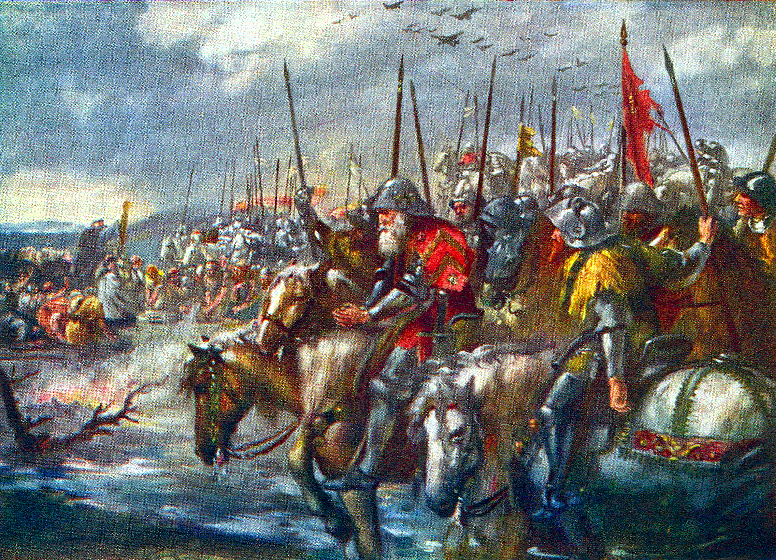 |
In 1422 Henry V died, and soon after so did the King of France. The Burgundians, now allied with England, supported the claim of Henry VI, the infant son of Henry V, and controlled most of Northern France, including Paris, but the Armagnacs refused to recognize the English claim and still controlled territory in Southern France. In 1428 siege was laid to their capital at Orleans, and the Armagnac cause was hanging by a thread. It was at this point that Joan of Arc, a seventeen year old girl with no military experience, arrived suddenly on the scene and dramatically changed the course of events. She first inspired the disorganized and dispirited French troops to attack the English surrounding Orleans and lift the siege. After several more minor victories, the French, again led by Joan of Arc, won a terrific Battle at Patay, which broke the English line, and soon after, the Dauphin was crowned at Rheims. Shortly after, Joan was captured by the Burgundians, tried, and executed as a witch.
In spite of their losses, the English were still optimistic about their prospects in France, when in 1435, the Burgundians deserted the English and allied themselves instead with Charles VII, the hereditary king of France. This dramatically changed the balance of power in the area, since England had depended on their Burgundian allies to hold territory that they had conquered. Although in terms of military tactics, weapons, and organization, England was clearly superior, France was too large and heavily populated to be occupied permanently unless England was allied with local interests. It had been the civil war within France that had created the opportunity for great English gains, and when the rift was healed, and France stood united against England, it was bound to prevail. It took many years to drive England all the way out of France, and the city of Calais didn't fall until the 16th century. But France had learned her lesson well, and the feeling of French nationalism was greatly enhanced by French victories over the English in the final years of the Hundred Years War.
| Date | Battle Summary | |
|---|---|---|
| Battle of Agincourt
(Lancastrian )
English victory
Fought October 25, 1415, between the French, numbering 50,000, under the Constable d'Albret, and about 15,000 English, mostly archers, under Henry V. The archers protected their front with a palisade of stakes, which broke the charge of the French men-at-arms, and the French army was routed with a loss of 10,000 slain, including the Constable and the Dukes of Alençon, Brabant and Bar, and 15,000 prisoners, including the Duke of Orleans and Marshal Boucicaut. The English lost only 1,600, among whom were the Duke of York and the Earl of Oxford. | ||
| Battle of Seine Mouth (Lancastrian )
English victory
Fought August 15, 1416, when the English fleet, under Bedford, sailed into the Seine with the object of revictualling Harfleur, which the French were besieging. The blockading force, consisting of 8 large Genoese carracks, besides smaller vessels, attacked the English fleet, and after six hours' hard fighting were totally defeated, with a loss of 5 carracks and 5 other ships, while Bedford succeeded in throwing supplies into the town. | ||
| Siege of Rouen (Lancastrian )
English victory
This city was besieged 1418, by the English, under Henry V. After a gallant defense the garrison surrendered January 15, 1419, the city paying a ransom of 300,000 crowns. | ||
| Battle of Beaugé (Lancastrian )
French victory
Fought March 22, 1421, between the English under the Duke of Clarence, and the Armagnacs, aided by the Scottish mercenaries, resulting in one of the few defeats sustained by the English during the French wars. The Duke and his immediate following, charging ahead of his troops, vigorously attacked the Scottish outposts, and, becoming separated from the main body, was surrounded and slain, all his gentlemen being either killed or captured. The bodies were afterwards recovered by the English archers, but the defeat was complete. | ||
| Battle of Cravant (Lancastrian )
English victory
Fought July 31, 1423. A force of Armagnacs under Buchan, Constable of France, with some Scottish mercenaries under Sir John Stewart, was advancing upon Craonne, the capture of which town would secure Charles VIIs communications with Champagne. They were attacked by the Burgundians and English under the Earl of Salisbury, and defeated with heavy loss. Both Buchan and Stewart were captured. | ||
| Battle of Verneuil (Lancastrian )
English victory
Fought August 18, 1424, between 3,000 English, under the Duke of Bedford, and 18,000 French and Scots, under the Constable Buchan and the Earl of Douglas. The men-at-arms on both sides fought dismounted, but the French could make no impression upon the English archers, who were protected by a barricade of stakes, and in the end were utterly routed, leaving over 4,000 dead on the field, among them Buchan and Douglas. The Duc d'Alencon was taken prisoner. | ||
| Siege of Orleans
(Lancastrian )
French victory
This city was besieged by the English, under the Regent, the Duke of Bedford, in October, 1428. In April, 1429, a French force, 7,000 strong, under Dunois and Joan of Arc, succeeded in entering, it having been found impossible to invest the place completely. After various successful attacks on the batteries erected by the besiegers, Joan, on the 6th and 7th of May, led the garrison to victory against the English lines, and on the 8th Bedford was compelled to raise the siege. | ||
| Battle of The Herrings
(Lancastrian )
English victory
Fought at Roncray-St.-Denis, February 12, 1429. Sir John Fastolfe was in charge of a convoy of salt fish for the English army before Orleans, and hearing of the approach of a French force, under the Bastard of Orleans, intrenched himself at Roncray. Here the French attacked him, and were repulsed with heavy loss, the Bastard being severely wounded. | ||
| Battle of Patay (Lancastrian )
French victory
Fought June 18, 1429, between the French, under Joan of Arc and the Duc d'Alenpon, and the English, under Talbot and Sir John Fastolfe. The English were retiring after the siege of Orleans, and their advanced guard under Talbot, being attacked by the French, was seized with a panic, and refusing to meet the charge of the French cavalry, broke and fled. The main body, under Fastolfe, however, maintained its formation, and made good its retreat to Etampes. Talbot was made prisoner. | ||
| Battle of St. Jacob an der Mirs (Armagnac War )
French victory
Fought September, 1444, between 30,000 Armagnacs, under the Dauphin, and 1,300 Confederate Swiss. The Swiss being hard pressed, occupied the hospital of St. Jacob an der Mirs, where they maintained the unequal fight until the last man had fallen. The Armagnacs, however, had lost 2,000 killed, and the Dauphin felt compelled to abandon the invasion of Switzerland. | ||
| Battle of Ragatz (Caroline )
Swiss victory
Fought March, 1446, between the Austrians and the Swiss Confederation. The Swiss gained a brilliant victory, which was followed by peace with Austria and the Armagnacs. | ||
| Battle of Formigny (Lancastrian )
French victory
Fought April 15, 1450, when the newly landed English reinforcements under Kyrielle were totally defeated, and almost annihilated, by the French under the Comte de Clermont. This defeat practically put an end to the English domination in the north of France. | ||
| Battle of Blanquefort (Lancastrian )
French victory
Fought November 1, 1450, when the English made a sally from Bordeaux to repel a marauding band under Amanien. The English cavalry, advancing too rapidly, became separated from the main body, and was cut off. Amanien then fell upon the infantry, who, being unsupported, were overwhelmed and almost annihilated. So great was the slaughter that the day was long known in Bordeaux as the "Male Journee." | ||
| Siege of Castillon
French victory
This was the last battle of the Hundred Years' War, and was fought July 17, 1453. The English under Talbot, Earl of Shrewsbury, marched to the relief of Castillon, and attacked the lines of the besiegers, but were taken in flank by a sortie from the French entrenchments and totally defeated, Talbot being slain. On October 19 following, Bordeaux opened her gates to the French. | ||
| Led a victorious army of longbowmen against France at Agincourt. | |
| Led the French Army to Victory at the Siege of New Orleans. Burned at the stake by English. |
| Book Links |
|---|
Image Links | ||
|---|---|---|
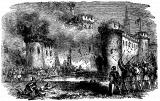 Storming of the Castle of Romorantin in Richard II |
 Storming of a town in Richard II |
 The battle of Crecy in Cambridge Historical Reader—Primary |
 Besiegers in Stories from English History |
 The Battle of Agincourt in Stories From English History, Part Second |
 English Soldiers Fighting in France in Stories From English History, Part Second |
 The maid of Orleans in France: Peeps at History |
 The morning of Agincourt in France: Peeps at History |
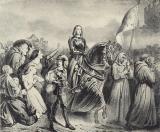 Raising the Siege of Orleans in France: Peeps at History |
 Philippa and the Burghers of Calais in The Story of the English |
 The Morning of the battle of Agincourt in The Story of the English |
 The Battle of Crecy in The Story of Old France |
 The Siege of Calais in The Story of Old France |
 King John and his son Philip at Poitiers in The Story of Old France |
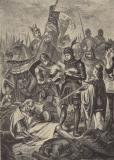 The Black Prince at the dead body of the King of Bohemia in Famous Men of the Middle Ages |
 Charge of the French at the Battle of Agincourt in Famous Men of the Middle Ages |
 The capture of Orleans by Joan of Arc in Famous Men of the Middle Ages |
 King John of France taken prisoner at Poitiers in The Story of the Middle Ages |
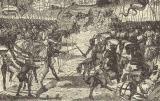 Battle of Poitiers in The Story of the Middle Ages |
Edward III. And the burghers of Calais in Back Matter |
 Joan riding into Orleans under torchlight in The Story of Joan of Arc |
 Joan fallen wounded under the walls of Paris in The Story of Joan of Arc |
 Joan taken at Compiegne in The Story of Joan of Arc |
 The English Before Calais in Patriots and Tyrants |
 Joan Entering Orleans in Patriots and Tyrants |
 They rushed into the fray like madmen bent upon sudden death in The Story of France |
 Enter, then, for the city is yours,' cried the maid in The Story of France |
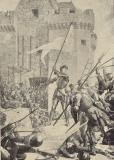 Joan of Arc at Orleans in Historical Tales: French |
 Warwick's messenger asking for aid to be sent to the Black Prince in Stories from English History |
 The French King brought prisoner to the Black Prince after Poitiers in Stories from English History |
 Joan of arc in The Discovery of New Worlds |
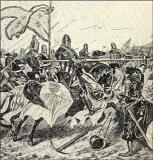 Battle of Crécy in European Hero Stories |
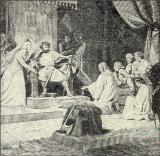 Queen Philippa Pleading for the Men of Calais in European Hero Stories |
 Joan of Arc Entering Orleans in Triumph in European Hero Stories |
||